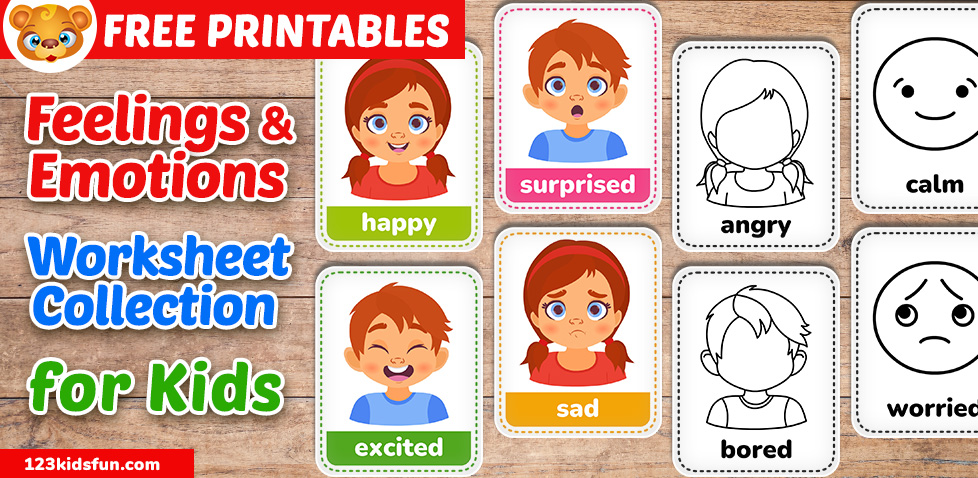
Understanding Preschooler Emotions
A Guide for Parents
The preschool years are a critical time for emotional development in kids. As a parent, understanding and supporting your child’s emotional growth is essential for their overall well-being. To assist in this journey, we’ve created the Understanding Kids Emotions Worksheet, a fun and interactive resource designed to help children identify and express their feelings.
In this article, we’ll explore common questions parents have about preschooler emotions and provide insights backed by scientific research and expert advice from parenting books. Be sure to check out the Understanding Kids Emotions Worksheet for practical activities that make learning about emotions enjoyable for your child!
What Are the Stages of Emotional Development in Preschoolers?
Preschoolers, typically aged 3 to 5, are in a phase of rapid emotional development. According to research published by the American Academy of Pediatrics, at this stage, kids start recognizing a broader range of emotions, such as pride, shame, guilt, and empathy. They are also learning to regulate their emotional responses, though tantrums and emotional outbursts remain common as they continue to develop self-control. To support this growth, resources like a Feelings and Emotions Activity Sheet for Kids can be invaluable in helping children identify and manage their feelings in a constructive way.
Emotions are powerful forces in children’s lives.
A child’s capacity to manage and understand their emotions predicts later success in school and relationships,” writes Dr. Daniel Siegel in his book The Whole-Brain Child. Siegel emphasizes the importance of helping young kids integrate their emotional experiences to foster resilience and emotional intelligence.
How Can Parents Help with Emotional Regulation?
Emotional regulation is one of the biggest challenges for preschoolers. Research published by the Journal of Child Development suggests that teaching children about their emotions can significantly improve their ability to manage them. Helping kids name and understand their emotions—whether it’s anger, sadness, or frustration—gives them the tools to process what they’re feeling.
“Labeling emotions helps children understand their internal world and make sense of their feelings,” states Dr. John Gottman, renowned for his work on emotional coaching. His book Raising an Emotionally Intelligent Child suggests that parents can take an active role in teaching emotional regulation by acknowledging the child’s emotions, offering comfort, and guiding them to appropriate solutions.
How Can Parents Help with Tantrums and Outbursts?
Tantrums are common in preschool-aged kids, as their brains are still developing the skills needed for impulse control. According to the Harvard Center on the Developing Child, during a tantrum, the child’s “fight-or-flight” response is activated, making it hard for them to think logically. This is why it’s crucial for parents to remain calm and offer support rather than punishment.
One effective strategy is described in the book No-Drama Discipline by Dr. Tina Payne Bryson and Dr. Daniel Siegel. They recommend using a “connect and redirect” approach: first, connect with the child by validating their emotions, then, once they are calm, redirect their behavior towards a more appropriate response. This method helps children feel understood, making them more receptive to learning new ways to manage their emotions.
How Can Parents Support Empathy and Social Skills?
Empathy begins to develop around the preschool years. Research from the National Association for the Education of Young Children (NAEYC) shows that when kids learn to understand their own emotions, they are better equipped to recognize and empathize with the emotions of others.
Parents can encourage empathy by modeling it in their own behavior and discussing emotions openly. Dr. Thomas Phelan, in his book 1-2-3 Magic, suggests role-playing scenarios where the child can practice understanding how others might feel. “Teaching children to see the world from another’s perspective is one of the greatest gifts a parent can give,”Phelan writes.
What Are Common Fears in Preschoolers, and How Can Parents Help?
Preschoolers often experience fears and anxieties, such as fear of the dark, fear of being separated from their parents, or fear of new situations. These fears are a normal part of development, as noted by the American Psychological Association. Studies show that up to 43% of children in this age group experience some form of fear or anxiety.
Parents can help by validating these fears and offering reassurance. In her book The Highly Sensitive Child, Dr. Elaine Aron advises that parents “avoid dismissing fears as irrational” and instead offer understanding and gradual exposure to the feared situation. This approach helps kids build confidence and resilience over time.
Building Confidence and Independence in Preschoolers
Building emotional resilience in preschoolers is not just about managing difficult emotions but also about fostering confidence and independence. According to Dr. Maria Montessori’s educational philosophy, “children build self-confidence through mastering small tasks.” Allowing preschoolers to take on age-appropriate responsibilities, such as dressing themselves or helping with simple chores, can significantly boost their self-esteem.
The Harvard Graduate School of Education emphasizes that when children feel capable, they are more likely to approach challenges with a growth mindset. This resilience becomes a key factor in their future academic and social success.
Conclusion
Emotional development in preschoolers is complex but crucial for their overall growth. By understanding your child’s emotional needs, helping them regulate emotions, and supporting their social skills and independence, you can foster a strong emotional foundation. As Dr. Daniel Siegel says in The Whole-Brain Child, “When parents nurture the emotional lives of their children, they build stronger, more resilient brains.”
By incorporating these strategies and insights from research, you’ll be well-equipped to guide your preschooler through their emotional development with patience, empathy, and love.








